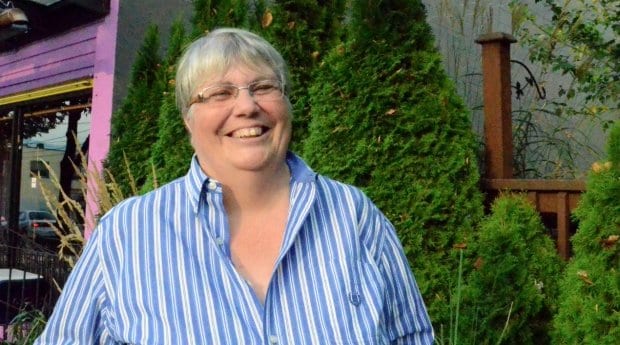This isn’t Jane Bouey’s first time around the civic block.
Bouey has already served two terms as a trustee on the Vancouver School Board, during which she chaired the board’s education and student-service committee, served on its Pride and special education committees, and held the position of vice-chair during her second term, from 2008 to 2011. Now she is running alongside Gwen Giesbrecht with the Public Education Project, a new party focused entirely on public education.
Bouey helped develop the Vancouver School Board’s policy on sexual orientation and gender identity in 2004, which was recently amended to be more trans-inclusive. It was during the intense debates that surrounded these amendments that she realized her work isn’t finished yet.
While Bouey describes many of the speakers as “incredibly inspiring” — particularly the trans, genderqueer and gender-variant students themselves — she also found that it could be extraordinarily difficult to listen to the backlash.
“I don’t think it’s an overstatement to say it was traumatic,” she says. “You’re listening to people who are ignorant in the true sense of the word, who don’t understand, and some people who are just filled with hate, for hours.”
Bouey hopes to secure more resources to help ensure the policy’s amendments are properly implemented. While the policy calls for all staff in the district to receive training on how to handle homophobia and transphobia in the classroom, limited funding means that at most, staff are being offered optional workshops. Fighting to make sure that scarce resources go toward supporting the most vulnerable students is a priority for Bouey, who is queer.
She recalls her own time at school as being mostly unhappy, with many missed days. These were feelings she pushed aside and didn’t address until a chance meeting with a homeless youth during her unsuccessful campaign for school board in 1999. They talked about how his queer identity had contributed to his being kicked out of his home and had made school hell for him. Hearing his story brought back her own feelings. For the first time, Bouey connected her own unhappiness in school to her identity.
“That’s when I chose to come out publicly in terms of the media and make that a major focus,” she says. “Fighting for those queer kids who can’t fit in at school and don’t fit in at home and try to make their lives a better place.”
While Bouey doesn’t see herself as a media figure, instead preferring to keep the focus on her policies and what she stands for, she is learning how important it is for people to have a sense of her as an individual.
“Particularly, I think it’s important for queer kids in school that are struggling to see that there’s someone out there who’s not afraid to say who they are. And it’s not that I’ve ever been afraid to say who I am, but I guess I’m willing to say it more loudly.”
That sort of openness has earned Bouey her share of backlash. There have been widely circulated emails — some aimed directly at Bouey, some at the parties she’s been affiliated with — attacking her work on inclusion policies. She’s also been on the receiving end of direct hate mail. It’s that opposition, however, that makes her eager to run again.
For Bouey, being involved is more than just a passion; it’s a responsibility. “It’s not easy running, and it’s not easy being a trustee, but I know what needs to be done, and I can’t just step aside and not voice what needs to be done.”

 Why you can trust Xtra
Why you can trust Xtra


